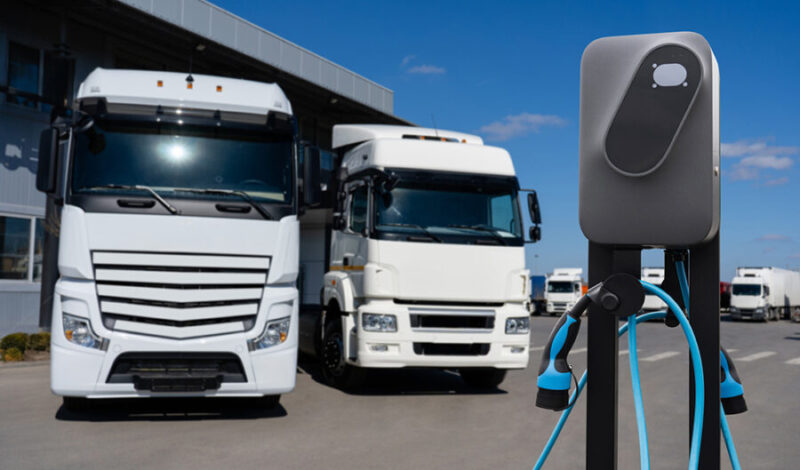Addressing Barriers to Electrified Trucking Fleets: A Collaborative, Scalable Approach to Propel Progress
June 16, 2025

A new MCSC white paper addresses the barriers to electrified trucking fleets.
Overcoming key barriers to decarbonizing the transportation sector, a complex and rapidly evolving landscape, requires a range of collaborative solutions. Decarbonizing trucking fleets in particular, a shared priority for many MIT Climate & Sustainability Consortium (MCSC) member companies, is one critical step forward. Through ongoing collaborations, MCSC researchers and industry representatives have been exploring how to accelerate the deployment of electrified trucking fleets – addressing the challenges and presenting opportunities to overcome them. These conversations have highlighted the potential of pooled investment and shared use of charging infrastructure as a powerful strategy to support this transition.
A new white paper co-authored by Danika Eamer, MCSC Impact Fellow; Henrik Holland, Global Head of Prologis Mobility at Prologis; and Dan Schnell, Strategy Manager at Accenture; and with shipper perspectives from Rob Moen, Freight Sourcing Director at Cargill; builds on these discussions and explores stakeholder perspectives across the trucking industry to better understand this promising path forward and identify practical next steps. The white paper, entitled Shared Electric Vehicle Charging Networks: A Flexible Approach to Support Deployment of Zero Emission Fleets, illustrates the economic and functional benefits of pooling infrastructure investment and calls for the establishment of an industry consortium that is dedicated to facilitating the planning and deployment of pooled charging infrastructure.
“There are clear theoretical benefits in terms of reduced investment cost from fleets pooling investment and use of charging infrastructure,” said Eamer, who leads the MCSC’s work in transportation. “The challenge is in how different players could coordinate the planning and management of shared infrastructure. We wanted to bring in diverse industry perspectives to explore not only the vast opportunities that exist, but also the hurdles we need to address to realize pooled charging infrastructure at scale.”
The authors examine these operational hurdles, and offer a framework to support a collaborative, shared approach to fleet transition planning that is also scalable. The framework provides guidance for fleets, infrastructure providers, and other industry stakeholders to collectively plan the pooled investment and shared use of charging infrastructure – helping to ease the burden of coordination. One example of an existing shared infrastructure structure is the Denker Hub, a collaboration between Prologis Mobility and Performance Team—A Maersk Company. The insights that are emerging from this provider-driven semi-private infrastructure model can help inform and shape future projects; this type of valuable information-sharing is one of the goals of the authors’ proposed consortium.
As electrification continues to evolve, learning from each other will remain central to moving forward.
“This white paper underscores the value of researchers and industry experts coming together to ideate and collaboratively examine an important decarbonization opportunity,” said Eamer. “Working with Prologis and Accenture, among others, has helped us address the most relevant challenges in realizing this concept and focus on its practical implementation.”
Read the white paper.
